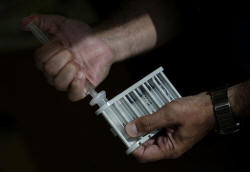|

7 things to know about ethanol
 Send a link to a friend
Send a link to a friend
[November 12, 2013]
(AP) -- President Barack Obama has called corn-based ethanol "the most successful alternative fuel we have ever developed." Billed as a green replacement for billions of gallons of gasoline, ethanol has enjoyed widespread political support. But the results of America's ethanol policy have not been as green as advertised.
|
|
 Here's what you need to know: Here's what you need to know:
1. Ethanol is an alcohol that is fermented and distilled from corn. Since 2007, when Congress required oil companies to blend billions of gallons of ethanol into their gasoline, it has become one of America's most widely produced renewable fuels.
2. When it burns, ethanol emits less carbon dioxide than gasoline. That's why it is a centerpiece of the government's plan to reduce greenhouse gases.
3. But getting ethanol from corn has a hidden environmental price that the government rarely acknowledges. America's ethanol policy has encouraged farmers to plant millions of new acres of corn.

4. More than 5 million conservation acres -- environmentally sensitive farmland that had been set aside and allowed to grow as grassland -- have disappeared on Obama's watch.
5. Every time a farmer plows into grassland, it releases carbon dioxide that had been naturally locked in the soil. In the name of reducing greenhouse gas emissions, the policy encourages a practice that emits greenhouse gas.
[to top of second column] |
 6. The corn boom has increased fertilizer pollution in Midwest waterways and beyond. Scientists say that's worsened a huge "dead zone" in the Gulf of Mexico.
7. Environmentalists and many scientists now say, when all the environmental factors are considered, corn ethanol is not a viable strategy for combating global warming. But it has been a boon to Midwest farmers. The Obama administration no longer pitches ethanol as a greenhouse gas strategy. Rather, it's frequently presented as a program that helps rural America.
[Associated
Press]
Copyright 2013 The Associated
Press. All rights reserved. This material may not be published,
broadcast, rewritten or redistributed.

|